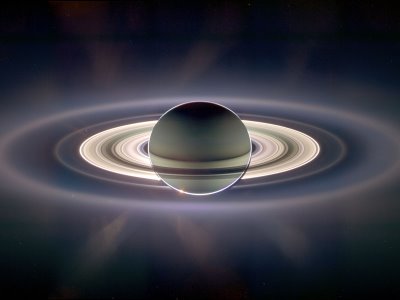 (image via NASA: Saturn eclipsing the sun, taken by the Cassini probe. In the larger image, you can see Earth just outside the main rings, to the left of the planet.)
(image via NASA: Saturn eclipsing the sun, taken by the Cassini probe. In the larger image, you can see Earth just outside the main rings, to the left of the planet.)(Also, an apology to Caroline, for encroaching on your Saturday. Yesterday I procrastinated, and then we had unexpected visitors for dinner, so I didn't get my post out on time.)
My love affair with science began in second grade, when one of my classmates' dads took several of us to a local park one summer night to do some star gazing. He had a telescope set up; looking back, it was probably about a four-inch reflector. All I knew then was that it was big and black, and perched precariously on a tripod, and we weren't supposed to touch it, but just step up on the foot stool, lean very carefully over the viewer, and peek through.
First he showed us Saturn. He pointed it out to the naked eye and told us that was a planet, and explained how a planet was different from a star. I remember looking at that faint white fleck about halfway up the sky. It was pretty unremarkable, really. Just another dot among many. But when I peered at that same fleck through a glass, I thought I was going to pee in my pants from excitement. It was no fleck -- it was a world! With rings! And its own moons!
And then came Mars. That little yellow speck, it was actually orange, and it had ice caps! And then the moon, my God, it looked so big, and all those craters! Some of the craters even had craters in them! It was like I could almost reach out and touch it! We were all so excited, we crowded around and asked for multiple turns at the scope.
While we were still reeling from this new reality, talking excitedly among ourselves, he turned the scope to the deep sky, and showed us just how many stars are really out there. I’d thought I knew – I’d looked up at the sky many times at night. But I hadn’t had a clue. The sky was thick with stars. Every tiny inch of space up there was swimming in them, all piled one on top of the other, stretching out forever in all directions.
And every single one of those dots was a sun. And every single sun might have its own worlds, each with their own moons, each possibly with their own life forms. Perhaps there was even a creature somewhere out there, peering back at me through a glass. I thought my brain was going to explode.
For me, science, and its spiritual sibling, science fiction, have always been a source of hope -- a hope grounded in reality, based on persistence, patience, and competence. No matter how grim things might seem, I could look up at the stars and know that there is a whole universe of discovery and possibility out there.
Jack Williamson gave us that. He lived in a land of big skies and big ideas, and he had an optimism annealed by unblinking integrity and a love of humanity. He supported aspiring writers -- I will never forget the time that he came to a reading of mine, simply to support me. I'll never forget his generosity of spirit.
One time, you know, a meteor landed in his back yard. I thought that was pretty cool. If you live to be ninety-eight, the odds accumulate that weird things will happen to you.
He will be sorely missed.
Postscript: I fear that my mention of Jack feels rather tacked-on. I had most of this post mentally composed and ready to write before learning of Jack's death. I had been reflecting on my love of science, technology, and SF, and how it has seen me through this past twelve years of our country's slow creep toward fascism. However bad things got, I could look up at the stars at night, and believe there were other times and other places where things were better. Faint echos of Susan Palwick's FLYING IN PLACE -- escapism is a very valuable device, when things seem grim.
But for me, Jack Williamson does stand for the best and brightest in science fiction. He was a renaissance man: educated in the arts and in the sciences, a creature of the enlightenment, a believer in the ability of rationalism and its fruits to help us solve many of our societal ills. People say he was a gentleman, and that's exactly right, but that label seems a poor approximation to describe his unfailing kindness and his thoughtful engagement with the world. His influence looms large among us in science fiction, both fandom and prodom. We are far better for his having lived.


1 comment:
Laura and I will be going to the memorial service in Portales, tomorrow.
Several people will be flying in, I suspect. They've got Connie Willis to talk, among others.
Post a Comment